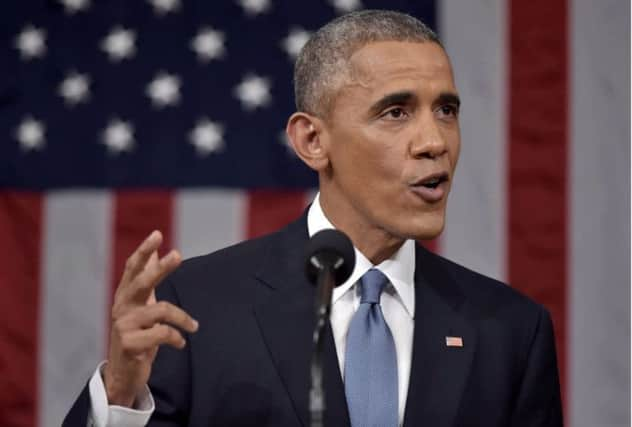Barack Obama unbowed in State of Union address


Mr Obama proposed tax increases for the wealthiest Americans coupled with more breaks for the country’s shrinking middle class.
Republican leaders were quick to dismiss the president’s proposals, which seemed more about giving his Democratic Party a platform in next year’s election than outlining a realistic legislative agenda.
Advertisement
Hide AdAdvertisement
Hide AdHouse speaker John Boehner said: “Finding common ground is what the American people sent us here to do, but you wouldn’t know it from the president’s speech tonight.”
Senator Joni Ernst, from Iowa, who delivered the official Republican response to Mr Obama’s speech, painted a less rosy picture of the economy.
She said: “We see our neighbours agonise over stagnant wages and lost jobs. We see the hurt caused by cancelled health care plans and higher monthly insurance bills.”
While the economy dominated the president’s address, Mr Obama also promoted his recent decision to normalise diplomatic relations with Havana and urged politicians to begin ending the trade embargo with Cuba that he said was “long past its expiration date”.
His nationally-televised address on Tuesday night to Congress was not so much a traditional laundry list of new proposals but more of an attempt to sell a broadly optimistic story of an economy emerging from the “shadow of crisis”.
FOLLOW US
The president said it was time for Americans to “turn the page” on years of economic troubles, terrorism and lengthy wars.
His address marked the first time in his presidency that he stood before a Congress controlled by Republicans, who grabbed control of the Senate from the Democrats in the November elections. The shift in the political landscape has been accompanied by economic growth and a soaring stock market, as the US continued its climb out of the recession that greeted the president when he took office in 2009.
With his once-sagging approval ratings on the rise, a confident Mr Obama saw little incentive in acquiescing to Republican demands.
Advertisement
Hide AdAdvertisement
Hide AdHe outlined an agenda that showed he was not going to curtail his own plans in favour of Republican priorities. While he appealed for “better politics” in Washington and pledged to work with Republicans, the president touted bread-and-butter Democratic economic proposals and vowed to veto Republican efforts to dismantle his signature achievements – in particular his health care law and post-financial crisis regulations.
“We can’t put the security of families at risk by taking away their health insurance or unravelling the new rules on Wall Street or refighting past battles on immigration when we’ve got a system to fix,” Mr Obama said. “And if a bill comes to my desk that tries to do any of these things, I will veto it.”
The president, who came out of his party’s bruising November election defeat with a surprising burst of activity, has already vowed to veto several Republican legislative measures.
Democrats seated on one side of the House of Representatives chamber repeatedly rose to their feet and applauded while Republicans sat silently.
The president sought more common ground on foreign policy, pledging to work with Congress on a new authorisation for military action against the Islamic State group in Iraq and Syria and legislation to guard against cyber attacks. In a rare move away from his own party, Mr Obama renewed his call for fast-tracking free trade agreements with Asia and Europe.